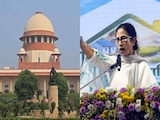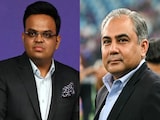Elon Musk's commercial space flight company SpaceX suffered a major setback after its latest reusable rocket that was under development, the massive Starship, exploded on the launch pad, causing a huge fireball. Does the explosion put a question mark on the safety record and culture followed at SpaceX?
On a separate rocket from a different space port, India's Astronaut Group Captain Shubhanshu Shukla is set to fly to space no earlier than June 22. The rocket he will use is the Falcon-9 rocket and Crew Dragon capsule.
This rocket launch has been repeatedly delayed since it was first scheduled to be held on May 29. Group Captain Shukla will fly from the Kennedy Space Center in Florida.
Incidentally a leak of liquid oxygen was reported on the Falcon-9 rocket by SpaceX itself and then Indian scientists stationed at the Kennedy Space Center, under the leadership of Dr V Narayanan, Chairman, Indian Space Research Organization (ISRO), had "insisted" on repairs and "validation", which incidentally SpaceX did carry out on India's insistence.
Subsequently, ISRO said "observations on Falcon-9 LOX (Liquid Oxygen) leak have been resolved by SpaceX". The Falcon-9 rocket has a 99.6% safety record in nearly 500 launches. Though it has had only 10 human space flights till date, all of which turned out to be a success.
In a post on X on Wednesday, Space X said: "On Wednesday, June 18 at approximately 11 p.m. Central Time, the Starship preparing for the tenth flight test experienced a major anomaly while on a test stand at Starbase."
SpaceX has neither released a video nor provided details to understand the intensity of the explosion but videos posted by independent observers showed a huge fireball and the entire launch pad covered by the blast.
SpaceX said "a safety clear area around the site was maintained throughout the operation and all personnel are safe and accounted for". "Our Starbase team is actively working to safe the test site and the immediate surrounding area in conjunction with local officials. There are no hazards to residents in surrounding communities, and we ask that individuals do not attempt to approach the area while safing operations continue," it said on the micro-blogging site.
The SpaceX Starship spacecraft and Super Heavy rocket - collectively referred to as Starship - represent a fully reusable transportation system designed to carry both crew and cargo to the Earth's orbit, the Moon, Mars and beyond. Starship is the world's most powerful launch vehicle ever developed, capable of carrying up to 150 metric tonnes fully reusable and 250 metric tonnes expendable. It is 123 meters high, almost 1.5 times the height of the Qutub Minar.
Starship was first tested in 2023 and since then, five out of nine flights have resulted in failures. The latest failure took place when SpaceX was to conduct a further test of the rocket. All three tests carried out in 2025 have failed. Experts said the prevailing ideology at SpaceX is "fail fast, learn fast!"
This SpaceX mishap comes on the back of Union Minister Jyotiraditya M Scindia announcing on June 17 that he "had a productive meeting with Ms. Gwynne Shotwell, President & COO of SpaceX, on India's next frontier in connectivity". "We delved into opportunities for collaboration in satellite communications to power Digital India's soaring ambitions and empower every citizen across the country. With India's digital revolution under the leadership of PM Narendra Modi ji, satellite technologies are not just relevant, they're transformative. Ms Shotwell appreciated the license granted to Starlink, calling it a great start to the journey," he said.
Mr Shotwell met several Indian space startups and also the Chairman of the Indian National Space Promotion and Authorization Centre (IN-SPACe), India's space regulator, Dr Pawan K Goenka. Though it is not clear if any discussions on the reasons behind the repeated delays on the launch of the SpaceX Falcon-9 rocket standing tall at pad 39-A, which is to fly the Axiom-4 mission, or on the safety aspects of this specific rocket were at all raised in these meetings.
Ms Shotwell on June 18 said "it was an honor to meet with Minister Scindia and hear his vision for expanding access to broadband internet. With our service licenses granted earlier this month, Starlink is one step closer to serving the great people of India."
An American aerospace expert NDTV spoke to said that "while rocketry remains a challenging field, especially in test and development, we are entering an era of increased use and expectations".
"The Federal Aviation Administration (FAA) approach to oversight has learnt a lot of lessons in recent years from Boeing and earlier Southwest Airlines relationship failures. With rocketry, we increasingly need to differentiate between oversight of operations that are becoming routine (and which the global community has come to depend on) and those that are pushing the boundaries. Even proven, reliable platforms can run into catastrophic edge case failures," the expert said.
Indian rocket experts' assertion for human space flight "safety first and safety always" is dictum. Incidentally, while India has had rocket failures, none have exploded on the launch pad.
Science Minister Dr Jitendra Singh on June 18 said that "after assessing the key parameters, including Module Fitness, Crew Health, Weather etc... Axiom Space has indicated that 22 June 2025 may be the next likely launch date of Axiom-04 Mission carrying, among others, the Indian astronaut Shubhanshu Shukla, to the International Space Station. Further updates, if any, shall be shared accordingly."















